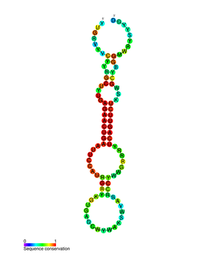MiR-146
| miR-146 | |
|---|---|

Conserved secondary structure of miR-146 microRNA precursor
|
|
| Identifiers | |
| Symbol | miR-146 |
| Alt. Symbols | MIR146 |
| Rfam | RF00691 |
| miRBase | MI0000477 |
| miRBase family | MIPF0000103 |
| Entrez | 406938 |
| HUGO | 31533 |
| OMIM | 610566 |
| RefSeq | NR_029897 |
| Other data | |
| RNA type | miRNA |
| Domain(s) | Mammalia |
| GO | 0035195 |
| SO | 0001244 |
| Locus | Chr. 5 q34 |
miR-146 is a family of microRNA precursors found in mammals, including humans. The ~22 nucleotide mature miRNA sequence is excised from the precursor hairpin by the enzyme Dicer. This sequence then associates with RISC which effects RNA interference.
miR-146 is primarily involved in the regulation of inflammation and other process that function in the innate immune system. Loss of functional miR-146 (and mir-145) could predispose an individual to suffer from chromosome 5q deletion syndrome. miR-146 has also been reported to be highly upregulated in osteoarthritis cartilage, and could be involved in its pathogenesis. mir-146 expression is associated with survival in triple negative breast cancer.
miR-146 is thought to be a mediator of inflammation along with another microRNA, mir-155. The expression of miR-146 is upregulated by inflammatory factors such as interleukin 1 and tumor necrosis factor-alpha. miR-146 dysregulates a number of targets which are mostly involved in toll-like receptor pathways that bring about a cytokine response as part of the innate immune system. miR-146 operates in a feedback system or "negative regulatory loop" to finely tune inflammatory responses.
miR-146 could be used as a biomarker for sepsis. In addition it was found to be absent from the exosomes of prion infected cells suggesting it could be used as a biomarker for prion infection. miR-146a could be targeted therapeutically as its depletion has implication in the hyperactive response to infection.
...
Wikipedia
